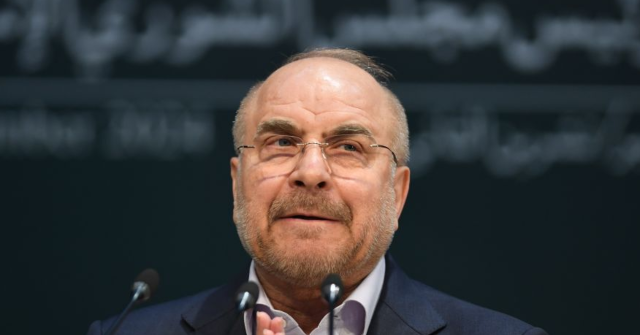Qalibaf is presently visiting Caracas as part of a broader three-country Latin American tour that will see him and his delegation visit Cuba, Brazil, and participate in the upcoming Parliamentary Forum of the BRICS anti-U.S. block. The Iranian parliament speaker and other regime representatives were received by Foreign Minister Yvan Gil and met with several Venezuelan officials on Sunday to discuss trade, education, and telecommunications ventures.
The visit, the Islamic Republic News Agency (IRNA) reported, seeks to “neutralize enemy plans” and eliminate trade barriers to evade U.S. sanctions imposed on both regimes.
“From Iran to Venezuela is a 17-hour flight, but our hearts are united; we share enemies and friends, and we must deepen our ties,” Qalibaf told reporters upon arriving in Caracas.
Qalibaf and his delegation met with Venezuelan officials at a hotel in Caracas and expressed that both countries are resolved to expand “all-out ties.” He called for a shift to non-dollar and national currencies trade, embracing the use of BRICS Pay, a proposed alternative to the SWIFT international banking system in bilateral trade.
Qalibaf further called on Tehran and Caracas to implement “long-term strategic agreements for cooperation,” stressing that countries that have common interests and friends and enemies can move “better and more cohesively.” Additionally, the Iranian official stressed that Tehran is determined to broker a free trade deal with Venezuela and remove banking obstacles between both countries.
“National currencies and the BRICS payment system can replace other currencies in the trade between the two countries,” Qalibaf said, speaking on the current situation of the central banks of both nations and sanctions.
“The definitive policy of the Islamic Republic of Iran is to develop relations between Iran and Venezuela,” he added.
Iran formally joined the BRICS anti-U.S. bloc in January 2024 after the group accepted its membership bid in 2023. Venezuela’s socialist dictator Nicolás Maduro has spent the larger part of the past decade unsuccessfully attempting to join the group. His last failed attempt took place last year after BRICS founding member Brazil reportedly vetoed Venezuela’s membership application on the grounds that Maduro breached the “trust” of far-left President Luiz Inácio Lula da Silva in the aftermath of the fraudulent July 28 presidential election.
Venezuelan Transportation Minister and head of the joint Venezuela-Iran commission Ramón Velásquez Araguayán claimed on behalf of the socialist Maduro regime that Qalibaf’s visit “fills us with strength, because it represents true exchange and unity among peoples with common interests.”
Velásquez Araguayán pointed out that the goal is to accelerate “as much as possible” the elimination of trade obstacles and bureaucracy between both countries so that their relations “can truly flow.” The Venezuelan official announced that, as part of the deepened trade ties between Iran and Venezuela, a new “Iran-Venezuela Scientific Center” and a new Iranian fiber optic cable factory will soon open in Venezuelan territory.
The Venezuelan official further announced that an Iranian insurance company has been established in Venezuela to provide a “good response regarding the issue of ship and aircraft insurance.” According to Velásquez Araguayán, the Venezuelan state-owned airline Conviasa has had Iranian insurance for three years.
“We hope that this meeting will resolve the obstacles that could hinder growth and economic exchange between the two countries, so that the Iranian-Venezuelan private and public sectors will not encounter difficulties in establishing a commercial structure that represents true integration,” Velásquez Araguayán said.
Similarly, Venezuelan University Education Minister Ricardo Sánchez met with the head of the Al-Mustafa University Ali Abbasi and other Iranian officials to discuss education ventures for Venezuelan nationals. Sánchez, a former Venezuelan “opposition” politician that joined the Maduro regime in recent years, praised the Iranian university and described it as an “academic institution renowned for its track record in Islamic studies, philosophy, theology, Islamic law, the Koran, and Hadith.”
Sánchez asserted that the meeting reaffirmed the commitment of the Maduro regime “to cultural diversity, international cooperation, and the comprehensive development of Venezuela, which are fundamental pillars for building a prosperous and supportive future.”
“Venezuela has promoted the consolidation of strategic alliances between the Islamic and Venezuelan peoples, promoting respect, cultural integration, and academic exchange as essential tools for the social and educational development of the country,” Sánchez said.
The authoritarian regimes of Iran and Venezuela first established their deep ties during the rule of late dictator Hugo Chávez (1999-2013), finding common ground in their shared anti-U.S. and anti-Israel stances, turning Venezuela into one of Iran’s top allies in the region. The two allied regimes reinvigorated friendly ties in recent years, largely after the official visit of Nicolás Maduro to Tehran in 2022 and late Iranian President Ebrahim Raisi’s June 2023 visit to Caracas. Maduro and current Iranian President Masoud Pezeshkian met in Russia in October and renewed their calls to stand together against the United States.
As a result of the collapse of socialism in Venezuela during the 2010s, the Maduro regime’s dependence on Iranian aid has grown. Some of the assistance that Iran has provided Venezuela includes an over $100 million deal to help repair Venezuela’s rundown oil refineries, Iranian fuel shipments to help offset Venezuela’s severe shortages, and reportedly help cover up oil spills caused by Iranian engineers’ “operational negligence.”
In return, the Maduro regime has granted several “gifts” to the Islamic regime, such as a supermarket chain that the socialists seized from private entrepreneurship given to Iranian individuals linked to the Islamic Revolutionary Guard Corps (IRGC). Caracas also gifted one million hectares of land to the Islamic regime in 2022. Several reports published in 2017 indicated that the Maduro regime provided Venezuelan passports to members of the Iran-proxy Hezbollah terrorist group.
Christian K. Caruzo is a Venezuelan writer and documents life under socialism. You can follow him on Twitter here
Breitbart News
Read the full article .


